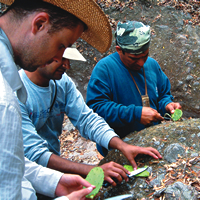| |
 |
| |
Scraping
by: Kellogg students and their guide prepare cactus during
their desert survival leadership experience this spring.
Photo © Amy Wang |
| |
|
Extreme
makeover
Leadership
club's spring break survival trip debuts in Mexican wilderness
By
Romi Herron
Before
spring break '06, desalinating water to drink was not a prerequisite
to surviving an MBA program.
It
is now, at least for those willing to answer the call of the
wild courtesy of a new Kellogg experiential leadership program.
The
initiative, led by the school's Business Leadership Club (BLC),
stripped 16 participants of the comforts of traditional spring
break for a weeklong extreme education in March. Unaware of
their exact destination, packing only a tarp, hammock, knife,
cup and the clothes on their backs, the group traveled to
the Mexican wilderness, near Puerto Vallarta.
"Normally
for an MBA student, a challenge is a tough class or a difficult
problem set. But the challenges [facing us on the trip] were
primitive," says Todd Auwarter '07, BLC president.
"We had no food, we slept in the cold, we had to hike
for hours to find water.
When you are focusing on surviving, you realize who
you really are."
The
excursion, he says, was a transformative experience in partnership
with Boulder Outdoor Survival School. The event began with
a two-day "impact period" to acclimatize participants
to heat, hunger and thirst.
Adapting to those conditions, say students, is where
the learning presents itself, culminating in evening reflections
among mosquito swarms and the night's chill.
A
long way from the Jacobs Center
The
grueling context can inspire exceptional leadership insights
— precisely the point of the excursion, says Mike
McClurg '07, BLC's vice president of integration strategy.
"The
off-site expedition builds self-awareness and leadership through
responsible risk-taking," says McClurg, who worked with
faculty to plan the program to provide students with an offering
that melds leadership theory and experience.
Tyler
Baldwin '07 also helped with the planning and garnered
critical insights during the trip once he saw how his zealousness
could leave others alienated. For instance, when the expedition
leader instructed the groups to boil salt water to desalinate
it, Baldwin set out to accomplish the task quickly, only later
realizing that speed was irrelevant. Other group members had
more concerns with the process itself.
"Later,
in the debrief, I realized my actions sidelined the group's
focus," Baldwin notes, adding that two female participants
said their suggestions often went unheard. "A key takeaway
for me is that I need to foster a variety of communication
styles."
Jeff
Smith '07 also emphasized teamwork as imperative not only
in outdoor survival, but management.
"The
importance of bringing a group to a common goal really played
out on the trip," he says. "Achieving consensus
is challenging, and to reach it you have to communicate effectively.
When we go through life under 'normal' conditions, you see
yourself in an isolated situation; in extreme conditions,
you learn how you react differently."
Enduring
the stress of hunger and fatigue gave participants a greater
sense of capability, empowerment and self-awareness, Smith
says.
For
Auwarter, the trip provided insights into how to set expectations,
focus and resolve.
"In
an era of 'bigger is better,' we rarely take the perspective
that things could be worse. But when you go for days without
water, it's far more useful to realize that temperatures could
be even hotter, instead of fixating on cold water that is
unavailable," Auwarter says.
The
leadership experience also taught participants to focus on
the present. With no watch to tell time or a map to chart
their course, the group had to deal with circumstances right
before them. Auwarter recognized simple pleasures he might
otherwise have overlooked, such as a tree's shade. Figuratively,
he compares this experience to the tendency of some business
executives to look too far ahead, overlooking current circumstances.
He
also discovered the value of perseverance and that achieving
his objective was "much sweeter" than it would have
been without a challenge.
Now,
BLC is looking to develop the course further.
McClurg
is working with the Kellogg administration to create a framework
so that alumni might participate in abbreviated experiential
offerings. Next year's adventure may be supplemented with
a classroom component focusing on leadership theory and group
dynamics.
Undoubtedly,
participants will also learn how to stay alive in the middle
of nowhere. Not a bad skill to have in the concrete jungle.
|



